Welcome to the 2013-2014 School Year
What a busy few days! It has been heartwarming to see your children’s excited faces as they enter into the classrooms, hear their cheerful greetings when they see an old friend or watch them as they poke the freshly made playdough or explore a new material. The school year has officially began! Below are my opening remarks from the Welcome Back Meeting and just a few of the photos from the slide show. Best, Renee
Tonight, we begin a journey together. On our journey, we will watch your children grow, develop and unfold. Together, we will experience the world through the eyes of your children. We will get to know each other’s personal stories and share our lives for a time. Together, we form an important bridge between your children’s lives at home and their lives at school.
At Greenhouse, we know that strong, supportive relationships provide the foundation for the rest of our work together. 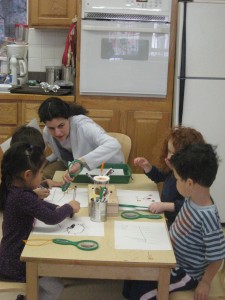 Relationships, including the relationship between school and home, teacher and parent, and teacher and child provide the context in which all other experiences and learning take place. Because we know that human beings develop in a social context, through direct interaction with one another, we put relationships at the forefront of all of our work.
Relationships, including the relationship between school and home, teacher and parent, and teacher and child provide the context in which all other experiences and learning take place. Because we know that human beings develop in a social context, through direct interaction with one another, we put relationships at the forefront of all of our work.
Your children will learn countless things in their time at Greenhouse. I believe that the most important thing they will learn is how to be in a social relationship with another person. Yes, they will practice writing their name and counting and quantity skills but a skill that is more subtle is the social learning that happens in the nursery school years. Our children will learn how to interpret and express their emotions and how to share a plan with another person and then carry that plan out. They will learn how to enter into play and how to cultivate and keep a friend. They will learn how to establish boundaries for themselves and how to respect the boundaries of others. These are important life skills—skills that are used every day in every social interaction we have for the rest of our lives—and they begin and are practiced at nursery school.
Children learn these skills by watching the people and adults around them. Both parents and teachers, model what it 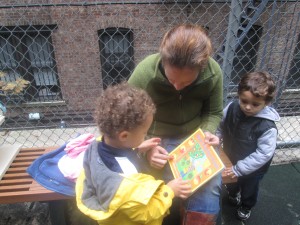 means to be in a relationship with another person. We can read books about friendship, we can remind children to say ‘please’ and ‘thank you’ but the best teacher of social skills will always be the living model we provide in our own daily lives. At Greenhouse, we know that children learn values and social skills by living them and by watching us. Our teachers know that by developing and fostering warm, loving relationships with children they are providing them a contextual model of positive social learning. We know that the give and take, the relational mode of each interaction, teaches children that school is a safe place. We respond quickly, appropriately and sensitively to the individual needs of each child. Because children are unique individuals and require different, varied things, responsive teaching is a complicated dance!
means to be in a relationship with another person. We can read books about friendship, we can remind children to say ‘please’ and ‘thank you’ but the best teacher of social skills will always be the living model we provide in our own daily lives. At Greenhouse, we know that children learn values and social skills by living them and by watching us. Our teachers know that by developing and fostering warm, loving relationships with children they are providing them a contextual model of positive social learning. We know that the give and take, the relational mode of each interaction, teaches children that school is a safe place. We respond quickly, appropriately and sensitively to the individual needs of each child. Because children are unique individuals and require different, varied things, responsive teaching is a complicated dance!
That dance begins with the phasing in period! I know that the next few weeks of shorten days and small groups might be a scheduling nightmare or logistical headache—but there is strong research that suggests young children need this time at the beginning of their relationships with teachers. I like to call it the ‘falling in love’ stage. Falling in love takes time and experience. With each passing day and each interaction, your children learn that these adults called teachers have fun things to do, a soft lap to sit on and warm smiles and hugs that match their gentle words and kind tone. The phase-in period also lets your children learn that their grown up will always come back at the end of the school day! Phase-in is an important time in our relationship building.
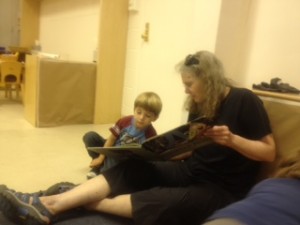
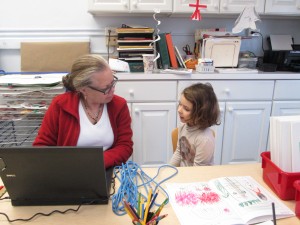 Teachers also help to build strong relationships with children by providing a rich, stimulating environment, consistent schedules that allow for small group work and one-to-one, face-to-face time, as well. In our interactions with children, we support their problem solving skills by leading and responding to their innovations. We facilitate meaningful conversations about your children’s personal stories and families, an interesting research question or a social conflict. We provide opportunities for more complex play through intentional use of language and questions like “I wonder….” And “What if….” And “Did you try…” We encourage your children to focus their attention and interpret their emotions and express their feelings in writings and drawings. Our teachers also make time to know the needs and interest of individual children. This knowledge of individual children lets us listen and adapt our approach to make sure we are giving each child what they need. We also know that these needs will change as your children change and develop. Our relational dance is only complicated by the fact that while we want our children to experience success in their learning, we need to balance our efforts and be sure to not provide too much or too little assistance.
Teachers also help to build strong relationships with children by providing a rich, stimulating environment, consistent schedules that allow for small group work and one-to-one, face-to-face time, as well. In our interactions with children, we support their problem solving skills by leading and responding to their innovations. We facilitate meaningful conversations about your children’s personal stories and families, an interesting research question or a social conflict. We provide opportunities for more complex play through intentional use of language and questions like “I wonder….” And “What if….” And “Did you try…” We encourage your children to focus their attention and interpret their emotions and express their feelings in writings and drawings. Our teachers also make time to know the needs and interest of individual children. This knowledge of individual children lets us listen and adapt our approach to make sure we are giving each child what they need. We also know that these needs will change as your children change and develop. Our relational dance is only complicated by the fact that while we want our children to experience success in their learning, we need to balance our efforts and be sure to not provide too much or too little assistance.
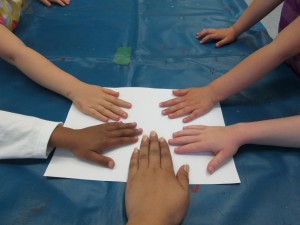 Close, warm, supportive relationships between your children and their teachers are core to school success. Equally important are the relationships between the children. Making a friend is hard work and keep a friend is even harder work. The skills of cooperation, empathy and impulse control needed to make and keep a friend are essential skills children need to practice. It is very important to remember that being in a relationship with another person is challenging (even for adults!) and it is especially challenging for children—who are just at the beginning of learning what it means to be in a relationship. They will learn these skills over time. They will learn these skills at different rates. Some days? They will forget some of the skills they learned. Some days will be harder than others. But we know and expect that, as it is part of the learning process. Learning how to be in a relationship is an ongoing process— one that is practiced in nursery school and easily lasts throughout your lifetime.
Close, warm, supportive relationships between your children and their teachers are core to school success. Equally important are the relationships between the children. Making a friend is hard work and keep a friend is even harder work. The skills of cooperation, empathy and impulse control needed to make and keep a friend are essential skills children need to practice. It is very important to remember that being in a relationship with another person is challenging (even for adults!) and it is especially challenging for children—who are just at the beginning of learning what it means to be in a relationship. They will learn these skills over time. They will learn these skills at different rates. Some days? They will forget some of the skills they learned. Some days will be harder than others. But we know and expect that, as it is part of the learning process. Learning how to be in a relationship is an ongoing process— one that is practiced in nursery school and easily lasts throughout your lifetime.
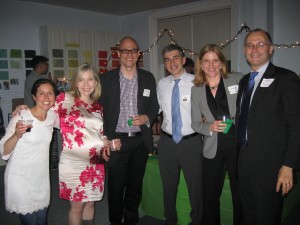 At Greenhouse, we also know the value of fostering reciprocal relationships with you—the important grownups in your children’s life. Your involvement in your children’s school life is essential! We make time to get to know your priorities and dreams for your children. We involve families in decisions that affect their child, when possible. We meet with families in one-on-one conferences to share our understanding of your children’s development. Through our Parent Association, we provide opportunities for parents to meet informally at planned events like our annual benefit and other gatherings for adults. We also provide opportunities for the whole family to gather at family events outside of school time like the annual Spring Fair, Apple Day Bake Sale and Family Picnics. We also offer individualized support for families who have questions about general child development. We want our relationship to lift and support you in your role as parents.
At Greenhouse, we also know the value of fostering reciprocal relationships with you—the important grownups in your children’s life. Your involvement in your children’s school life is essential! We make time to get to know your priorities and dreams for your children. We involve families in decisions that affect their child, when possible. We meet with families in one-on-one conferences to share our understanding of your children’s development. Through our Parent Association, we provide opportunities for parents to meet informally at planned events like our annual benefit and other gatherings for adults. We also provide opportunities for the whole family to gather at family events outside of school time like the annual Spring Fair, Apple Day Bake Sale and Family Picnics. We also offer individualized support for families who have questions about general child development. We want our relationship to lift and support you in your role as parents.
As we begin our journey together tonight, know that we are excited to entering into this relationship with you and your family. In our work, the faculty and staff of Greenhouse strive to recognize your child and become familiar with and respect your child’s individual way in the world. We also commit to supporting you in your role as a parent and tonight we honor the ongoing process of being in this relationship with you and your family. We look forward to the journey this school year will be.
Warmly,
Renee and the entire faculty and staff at Greenhouse